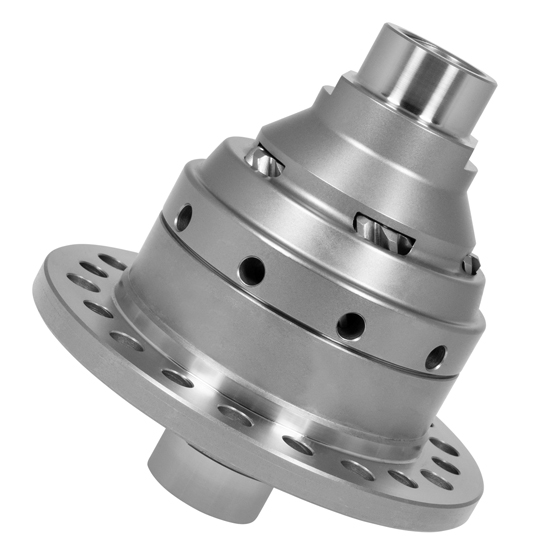

















The Spartan Helical LSD’s helical-cut worm gears seamlessly funnel torque to the tire with the best grip. Its 10-pinion design is stronger than 6- or 8-pinion units because it has more points of contact to deliver optimal load distribution.
Warranty information unavailable
The primary function of a limited slip differential (LSD) is to effectively distribute torque as needed. During regular driving conditions, a positraction LSD is engaged, ensuring equal traction is provided to both wheels. However, when the throttle is aggressively pressed, tight corners are taken, or when navigating through loose gravel trails, the LSD kicks in to limit wheel spin across the drive axle. It achieves this by allowing the axle shafts to spin at different speeds while continuously attempting to balance the distribution of torque between the two axles. Consequently, power is transferred to the wheel that has the best traction, thereby improving grip, control, and overall predictability of the vehicle.
Learn more about limited slip differentials in our How It Works blog article here.
Watch our “Are Posis Worth It?” video to get more info about limited-slip differentials.
When traveling in a straight line where wheel speeds are identical on both sides, all LSDs continuously provide equal traction to both tires. The difference between LSD types has to do with how this occurs and what happens when additional traction is needed.
In a clutch-type unit, the spring array applies pressure to the side gears which puts pressure on the clutch packs in the outer part of the carrier. Both axles get equal pressure and both tires get equal traction. When a tire starts slipping, the clutch packs are engaged with different resistance. The clutches work to maintain synchronization between the tires, transferring more torque to the tire that has the best grip while reducing torque transfer to the tire that has less grip.
A gear-type LSD has no frictional surfaces to initiate torque transfer. It uses floating helical-cut worm gears that operate in pockets and mesh together. Under normal driving conditions this type of LSD acts like an open diff. When acceleration or wheel slippage occurs, axial and radial thrust is applied to the helical gear pinions in their pockets. Under these loads, more torque is transferred to the tire with the best traction in a progressive manner as torque is withheld from the tire that is slipping.
Yes. Your ride will drive better than ever because both wheels will receive traction. When things get hot the Spartan Helical LSD will limit wheelspin across the drive axle by permitting the axle shafts to spin at different speeds while continuously trying to balance the application of torque between the two axles. This results in transferring more power to the wheel with the best traction. This improves vehicle control and performance. Mashing the throttle, taking a tight corner aggressively, or working through loose gravel or challenging sections of trail will actuate the unit’s gear array to increase your traction.
Get for more information on the Spartan Helical LSD and LSDs in general in our Stengths & Advantages Of The Spartan Helical LSD blog article.
Some are, some aren’t.
Clutch-type LSDs, like our Dura Grip, can be rebuilt. Rebuilding involves replacing the clutches in the unit. The clutches can be replaced to bring the unit back to its original performance level, or non-stock clutches with different friction characteristics and springs with custom compression rates can be used to fine tune the Dura Grip’s performance to better match the style of driving/racing you are doing.
Gear-type LSDs, like our Spartan Helical, do not require rebuilding because there are no clutches to replace, there is nothing to rebuild. The unit’s internal worm gears should last the life of your vehicle.
Using non-synthetic 80W-90 GL-5 will produce optimum performance in our Dura Grip clutch-type units.
Learn more about LSD oils, and drivetrain lubrication in general, by watching our “Tech Talks, Oils and Additives” video.
First, this product is for clutch-type differentials only, not gear-driven limited slips like our Spartan Helical LSD. Friction modifiers are all about chatter. They guard against abnormal clutch engagement and/or disengagement (source of the chatter), ensuring the proper friction characteristics between clutch discs are maintained.








